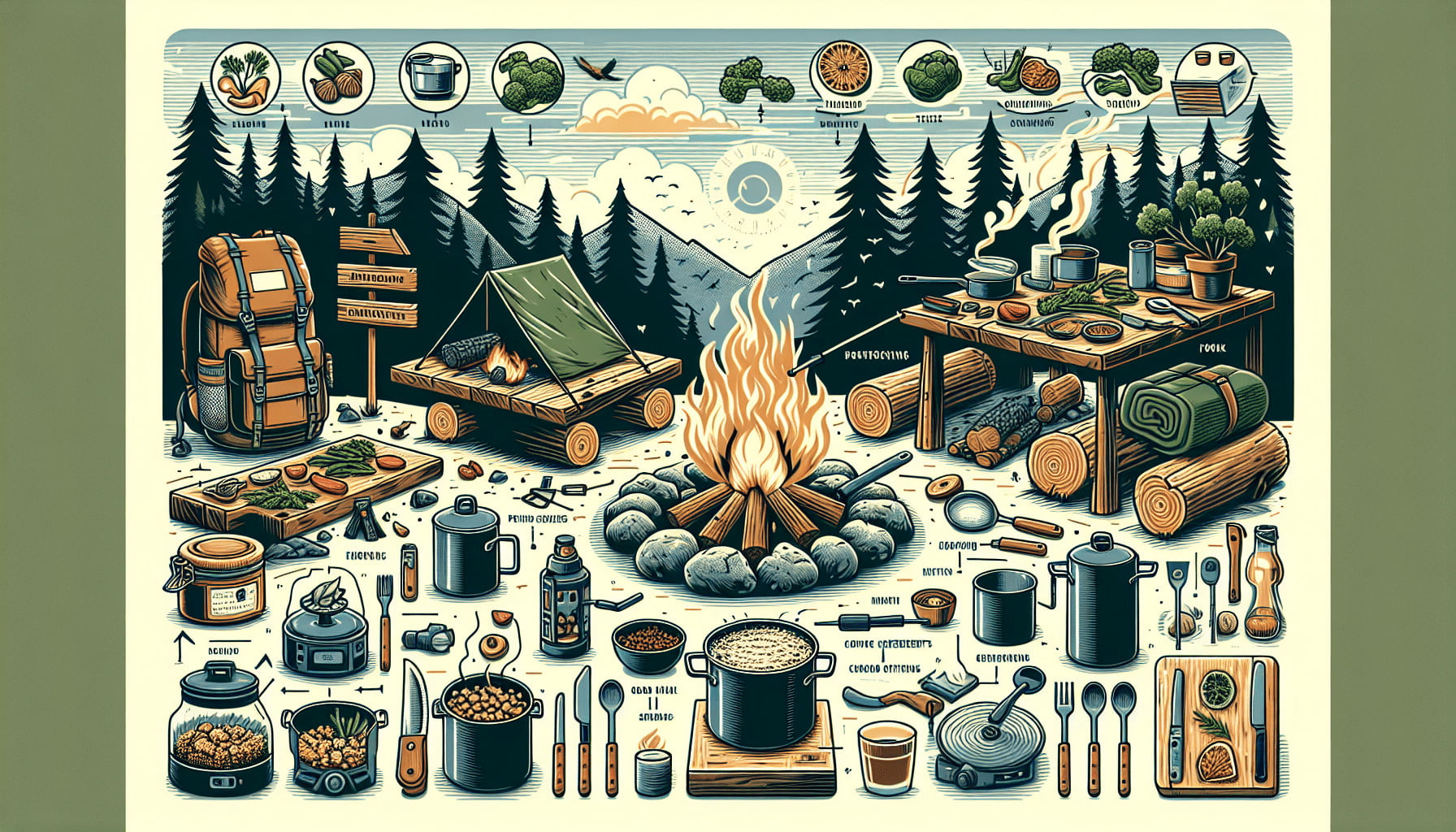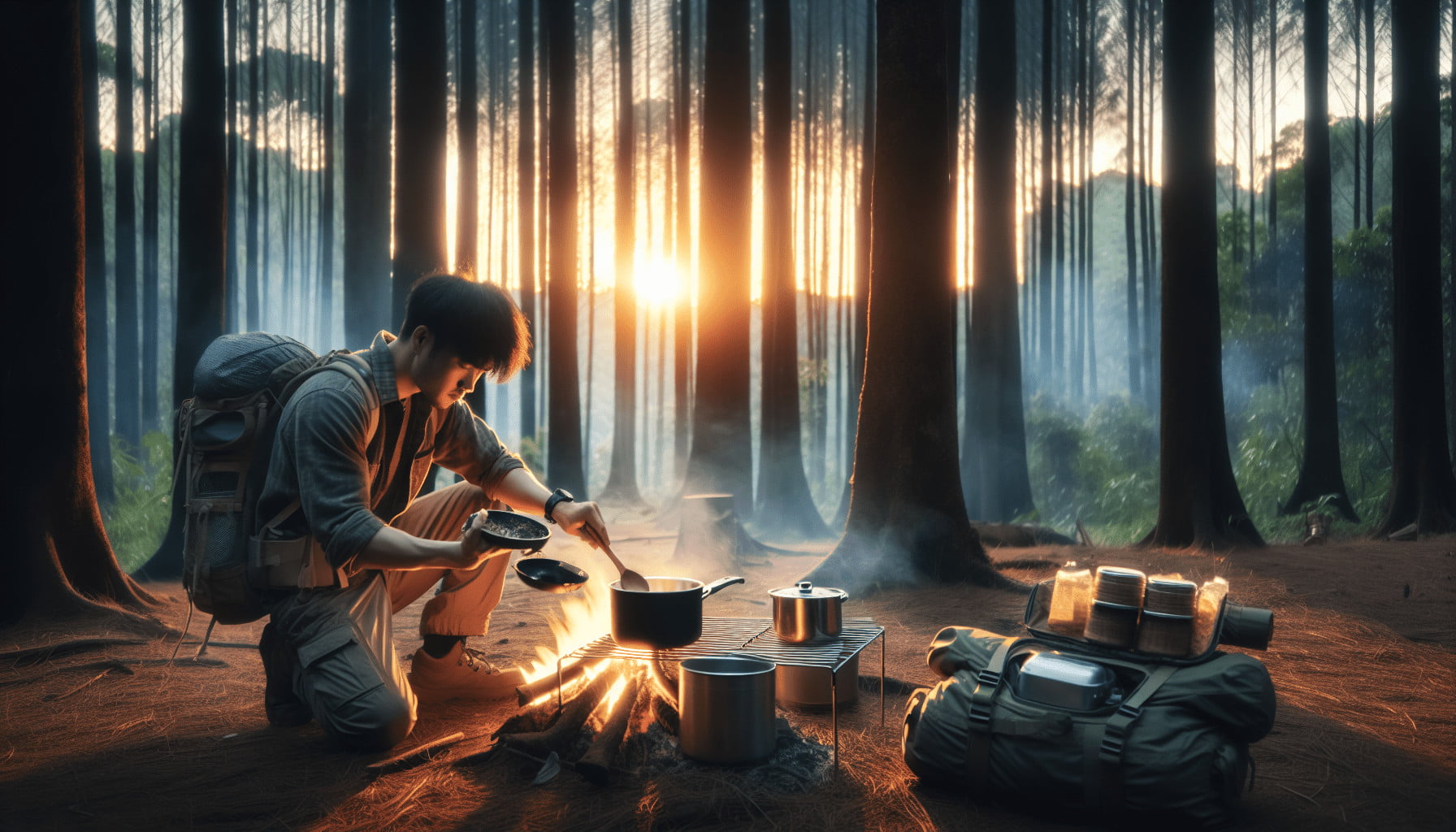Are you a backpacker yearning for an unforgettable campfire cooking experience? Look no further! This article will provide you with essential tips and tricks to elevate your outdoor culinary skills. From selecting the right cooking equipment to mastering the art of fire management, we’ve got you covered. Get ready to transform your campsite into a gourmet kitchen and impress your fellow adventurers with delicious and hearty meals over an open flame. Let’s embark on a mouthwatering journey of campfire cooking together!
Choosing the Right Cookware
When it comes to preparing meals while backpacking, choosing the right cookware is crucial. Considering that you’ll be carrying everything on your back, it’s important to select lightweight and durable cookware that won’t weigh you down. Look for materials like aluminum or titanium, which are known for their lightness. These materials are also durable and can withstand the rigors of outdoor cooking.
Another factor to consider is whether to choose non-stick or stainless steel cookware. Non-stick cookware is convenient because it makes cleaning up a breeze, but it may not be as durable as stainless steel. On the other hand, stainless steel cookware is a bit heavier but tends to be more durable and long-lasting. Think about your specific needs and preferences when making this choice.
Lastly, consider the size and capacity of your cookware. Opt for pots and pans that are large enough to accommodate your meals but not so large that they become cumbersome to carry. It’s also useful to choose cookware with nesting capabilities, meaning that one piece can fit inside the other to save space in your backpack.
Packing Essentials
When you’re packing for a backpacking trip, there are a few cooking essentials that you shouldn’t forget. First and foremost, bring along a compact camping stove. This will allow you to cook meals regardless of the availability of a campfire. Camping stoves are lightweight and easy to use, making them a great addition to your backpacking gear.
Next, make sure to carry a lightweight pot and pan. Look for ones that are made of aluminum or titanium, as these materials are both lightweight and durable. Consider the size of your group and choose cookware that can accommodate the number of people you’ll be cooking for.
In addition to pots and pans, don’t forget to pack essential utensils like a knife, spatula, and tongs. These tools will come in handy when preparing and serving your meals. Look for lightweight and compact versions to minimize their impact on your overall backpack weight.

Meal Planning and Preparation
Efficient meal planning and preparation can make a world of difference when it comes to enjoying your backpacking meals. Start by planning your meals in advance and pre-measuring your ingredients. This will save you time and effort while you’re out in the wilderness. Store your pre-measured ingredients in small, sealed bags to keep them organized and easily accessible.
When it comes to selecting food items, opt for non-perishable and lightweight options. Dried fruits, nuts, granola bars, and dehydrated meals are great choices for backpackers. They provide essential nutrients and are easy to carry. Additionally, packing dehydrated meals that you’ve prepared at home can save you both weight and cooking time. Simply add hot water to rehydrate the meals, and you’ll have a delicious, lightweight backpacking feast.
Fire Safety and Cooking Techniques
Cooking over a campfire can be an enjoyable and rustic experience, but it’s important to prioritize fire safety. Before starting a campfire, choose a safe location that is away from flammable materials such as trees, bushes, or dry grass. Clear the area around the fire pit to create a buffer zone.
When it comes to cooking techniques, there are several methods you can learn for campfire cooking. Grilling is a popular choice, where you cook your food directly over the fire on a grill grate or skewers. Boiling is another common method, especially for heating water or cooking foods like pasta. Experiment with different techniques to find what works best for you and your meals.
Remember to always monitor and control the fire to avoid accidents. Never leave a fire unattended, and be sure to extinguish it completely before leaving your campsite or going to sleep. This will help prevent wildfires and ensure the safety of yourself and others in the area.

Campfire Recipes
Cooking delicious meals over a campfire is not only possible but also a delightful experience. One easy and versatile campfire cooking method is using foil packets. Simply wrap your ingredients in foil and place the packet directly on the coals or grill. This method allows for easy cleanup and creates moist and flavorful dishes.
For more substantial meals, learn how to cook pasta, rice, and grains over a campfire. It may take a bit longer than cooking on a traditional stove, but the smoky flavors and unique experience are worth the extra time and effort. Invest in a lightweight cooking pot to make this process easier.
Don’t forget about indulging in tasty desserts while camping! Classics like s’mores and campfire pies are easy to make and are sure to satisfy your sweet tooth. Get creative with your recipes and enjoy the unique flavors that cooking over a campfire can bring.
Wilderness Foraging
Foraging for edible plants and mushrooms in the wilderness can add a whole new dimension to your backpacking meals. Learn to identify edible plants and mushrooms in the areas you’ll be exploring, but always exercise caution and gather only what you are confident is safe to eat. It’s essential to familiarize yourself with local regulations and restrictions on foraging.
In addition to plants and mushrooms, consider gathering wild berries and nuts to add flavors and nutritional variety to your meals. Make sure to properly wash and prepare any wild ingredients before consuming them. Foraging can be a rewarding and sustainable way to enhance your backpacking experience, but it should always be done responsibly and with respect for the environment.
Cleaning and Waste Management
Maintaining cleanliness and properly managing waste are essential aspects of responsible backpacking. When it comes to cleaning your cookware, dispose of food waste properly to prevent attracting wildlife. Avoid leaving food scraps behind, as they can disrupt the natural ecosystem and pose a risk to wildlife.
Use biodegradable soap for dishwashing to minimize your environmental impact. Look for soap that is specifically designated as safe for use in nature, and follow instructions for proper disposal. Leave no trace and clean up your campsite thoroughly after cooking to ensure that future visitors can enjoy the same pristine natural setting.
Safety Tips
Safety should always be a top priority when cooking outdoors. Keep a first aid kit handy in case of minor accidents or injuries. It’s always better to be prepared and have the necessary supplies to address any mishaps that may occur.
Follow proper food safety guidelines to prevent foodborne illnesses. Maintain proper hygiene while handling food, and ensure that perishable items are kept at safe temperatures. Pack a cooler or use insulated bags if necessary to keep your ingredients fresh and safe to consume.
Lastly, never leave a fire unattended, even for a short period. Always extinguish the fire completely before leaving your campsite or going to sleep. This will prevent the risk of accidental wildfires and ensure the safety of everyone in the area.
Seasonal Considerations
Seasonal variations can significantly impact your backpacking experience and cooking techniques. During colder weather, it’s essential to cook warm and hearty meals to keep yourself comfortable and nourished. Opt for soups, stews, and warm beverages to help you stay warm from the inside out.
In hot weather, it’s best to plan meals that require less cooking time and avoid excessive heat. Opt for salads, sandwiches, and cold wraps that are refreshing and don’t require a lot of heat to prepare. Take advantage of seasonal fruits and vegetables to add freshness and hydration to your meals.
Adjust your cooking techniques based on weather conditions. For example, during windy conditions, it may be beneficial to use windshields or wind guards to protect the flame and maintain an efficient cooking environment. Adaptability is key when it comes to cooking in different seasons, so be prepared to make adjustments as needed.
Resources and Further Reading
To further enhance your campfire cooking skills and gain inspiration for new recipes, there are numerous resources available. Look for books and websites that specialize in campfire cooking recipes and tips. These resources often provide detailed instructions, ingredient suggestions, and creativity to elevate your outdoor cooking experience.
Joining online communities and forums dedicated to backpacking and camping can also be a valuable source of knowledge. Learn from experienced backpackers, share your own tips and tricks, and find inspiration for your next outdoor cooking adventure. These platforms often provide a wealth of information and allow you to connect with like-minded individuals who share your passion for outdoor cooking.
Additionally, consider taking a wilderness cooking class or workshop to enhance your skills. These specialized courses provide hands-on experience and expert guidance to help you become a master of campfire cooking. They offer a unique opportunity to learn new techniques, expand your culinary repertoire, and connect with fellow outdoor enthusiasts.
In conclusion, campfire cooking for backpackers can be a rewarding and memorable experience. By choosing the right cookware, planning your meals in advance, and practicing fire safety, you can enjoy delicious and satisfying meals even in the wilderness. Remember to respect the environment, follow safety guidelines, and continuously expand your knowledge and skills. Happy cooking!
